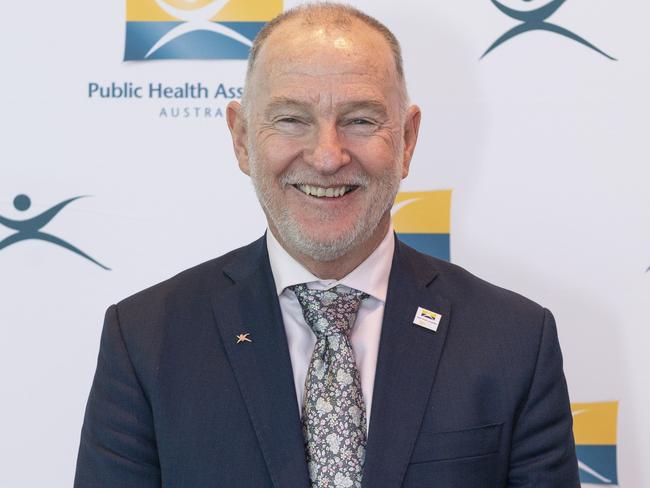Silent epidemic exposed with fears for next generation
Almost half of our youths are living with chronic disease or developmental conditions like ADHD. There’s a concerning link as to why.

Conditions
Don't miss out on the headlines from Conditions. Followed categories will be added to My News.
Unhealthy foods, sugary drinks, smoking, alcohol and screen time have pushed teenagers into a health crisis, with an Australian-first study revealing almost half are living with chronic disease or developmental conditions such as ADHD.
The dire report, exposing the shocking extent of the silent epidemic affecting 45.6 per cent of the nation’s youth, is released on Wednesday.
Researchers looked at unhealthy behaviours and mental health and how that overlapped with emerging health conditions in teens such as irritable bowel syndrome, asthma, eczema, chronic fatigue, hay fever, food allergies, type 1 and type 2 diabetes, attention deficit and hyperactivity disorder and autism spectrum disorder.
University of Sydney lead author Bridie Osman said: “These conditions can have a profound impact.
“They can hinder a teenager’s ability to attend school or sports and can have social and developmental implications.
“Some of these chronic health conditions can also cause ongoing damage to the immune system and contribute to more severe diseases in later life.
“This is the wake-up call that we need to do more to prioritise the health of young people.’’
Read more on this important issue in the second half of our editorial.

She said there needed to be a whole-of-lifestyle approach to help with prevent and treat young people.
That included targeting processed food, cutting screen time, improving mental health and tackling alcohol and tobacco.
The author emphasised that while the study could not demonstrate that diseases and conditions were caused by unhealthy lifestyles, there was a clear link that was important and required further investigation.
The study was published in the Australian and New Zealand Journal of Public Health.
The study of more than 5000 teenagers found the most common chronic diseases in teenagers were hay fever (23 per cent) and asthma (15 per cent).
The most common developmental condition was ADHD, affecting 9 per cent of participants.
Female teens who consumed more ultra-processed foods, sugary drinks and alcohol, as well as spending more time on screens or coping with a mental health condition were more likely to have at least one chronic disease or developmental condition.
Boys were at higher risk than girls of chronic disease even if they had the same mental health condition.
Ally Mazey said she had been encouraging her children Oscar, 15, and Zoe, 12, to eat healthy.

“Trying new things and trying them on multiple occasions seems to broaden their tastebuds,” she said.
“I try not to push what they don’t like eating but have available the options that they do like.”
Ms Mazey said home-cooked meals were one of the best ways to teach her children about nutrition.
“I’ve realised that making them myself gave them an idea of what sorts of foods go into different dishes they like to eat,” she said.
Royal Australian and New Zealand College of Psychiatrists Queensland chair Brett Emmerson said mental health services were grossly underfunded and disjointed.
“Neither party in the federal election is giving much attention to mental health. Youths and adults need more help,” Prof Emmerson said.
Australian Medical Association Queensland president Nick Yim said the research highlighted the desperate need for government investment in preventive health.
“The development and progression of disease is complex and amplified by many factors, meaning there is not always one cause,’’ he said.
“We encourage anyone concerned about their own or their child’s susceptibility to chronic illness to speak with their GP.’’
Dr Yim said despite the progression in mental health awareness and support over the past few decades, access to mental health services remained a challenge.

“The mental health workforce, like our broader medical workforce, is understaffed especially in our public hospital mental health units,’’ he said.
“AMA Queensland has been calling for broader reforms to ensure patients with chronic health conditions and those seeking mental health support aren’t ending up in emergency departments.’’
The AMA called for an increase in Medicare rebates for longer mental health consults, funding support for skills maintenance and upskilling in essential fields like mental and chronic health, as well as more support for collaborative, holistic and team-based care.
“Unfortunately, these emerging areas of health remain under researched, and as a result, under resourced,” Dr Yim said.
Public Health Association of Australia CEO Adjunct Professor Terry Slevin said it was a significant study with important findings, particularly when it came to warnings around the increasing deterioration of young people’s diets.
“We need to do more to help all Australians, particularly teenagers, choose the right foods to set them up with good physical and mental health,” he said.
“That’s why we are calling on the next federal government to take comprehensive action on diet and obesity.
“We need to stop children from being bombarded with unhealthy food advertising, mandate health star ratings on packaged foods, and increase awareness of the benefits of a good healthy diet.”
Originally published as Silent epidemic exposed with fears for next generation



